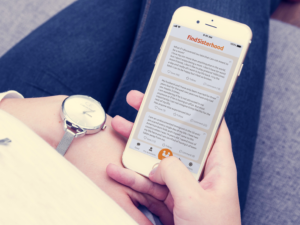Thankfully, we live in a time when women drive the public conversation about women’s issues around the world. The recent #MeToo movement has become a worldwide phenomenon, spreading virally on social media and growing into a crucial force behind high-profile scandals including those of Harvey Weinstein and Bill Cosby. The sense of community created by #MeToo empowered many women to come forward and be vocal, sometimes even under the media spotlight, about being sexually harassed or assaulted.
Beyond sexual harassment, there are plenty of personal experiences that women may feel not comfortable sharing out loud. Not yet, perhaps; admitting mixed feelings about motherhood, dealing with a crippling eating disorder, or accepting the consequences of a miscarriage—it all boils down to the most delicate, intimate path, where only women know what’s best for them.

To encourage unfiltered sharing, Ana Pompa Alarcón Rawls, a mother of two, decided to create an anonymous social network where women could feel protected enough to be 100% sincere. Launched in Boston three weeks ago as a free mobile app, findSisterhood uses one-way cryptography to grant anonymity to self-verified female users, who chat freely about motherhood, fertility, sexuality and self-worth.
Pompa Alarcón Rawls came up with the idea four years ago, after giving birth to her first child in New York City. At a time when she couldn’t rely on any support network, she quickly realized that for her, motherhood was not the experience pictures on social media depicted. In fact, she dealt with postpartum depression.
“I [didn’t] feel like taking selfies of my postpartum body… or taking the perfect food pictures of the home-cooked baby meals,” she said. “I was actually really struggling.”
Still, something good came out of social media. Pompa Alarcón Rawls started connecting with women on Facebook, posting on different groups, and ended up talking with more than 400 women who agreed: motherhood “is not all fun, but we feel the social pressure and we put it on ourselves,” she said.
Local
In-depth news coverage of the Greater Boston Area.
Feeling not alone, she listened to the feedback from her online friends and refined the idea of findSisterhood as “a safe space,” where women are sure to connect with other women but are also positive they can’t be tracked down. Initially designed with a gender-verification tool connected to Facebook, the app now allow users to self-verify their gender. In addition, one-way cryptography makes all posts 100% untraceable, including for the findSisterhood team of six.
As a member of the latest MassChallenge Boston cohort, findSisterhood will stay in Boston until mid-October; Pompa Alarcón Rawls admitted that the company has no formal roots, but its main investors and mentors are in the city. Currently, the company raised $100,000 from angel investors (including Joe Caruso), “with more commitments to be announced as part of a seed round,” Pompa Alarcón Rawls said.
The week after Sept. 10, its first day of launch, findSisterhood was downloaded 1,500 times, gathering around 5,000 stories (Pompa Alarcón Rawls declined to disclose more recent statistics). Conversation topics are gathered around 20 clusters, from “Friends with Benefits” to “Toxic Relationships,” including “Positive Mindset,” “Pelvic Floor Issues” and “Cannabis and Sex.” The sill basic features of the social media platform allows users to “love,” follow or comment posts; the app is available on both Apple Store and Google Play.
Self-acceptance is not an easy, or quick, process—especially when it involves the deepest shades of our personalities, shaped in memories from years ago and buried away. It starts with baby steps: sometimes, even telling a stranger how we really feel is a huge step in the right direction.



